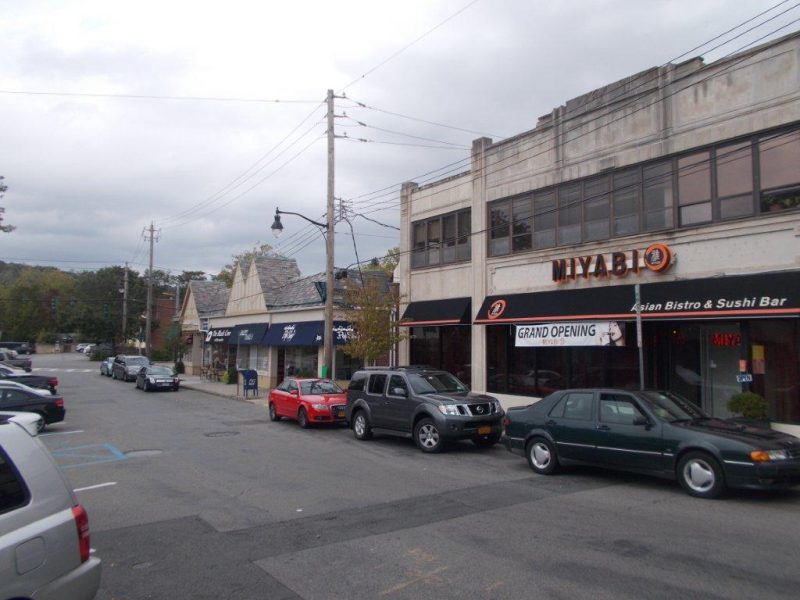Temporarily halting development for Pleasantville’s downtown business district will be considered next month after repeated pleas from some residents that the pace of development is overwhelming the village.
If approved, a six-month moratorium would be retroactive to Nov. 16, the date of last month’s town hall on development where multiple residents requested that officials impose a pause on reviewing new projects.
The local law proposing a moratorium is expected to be formally introduced at the Dec. 28 Village Board meeting. If approved, a public hearing will be scheduled for late January.
The moratorium would be applied only to the village’s Central Business A1 District where any applications submitted on or after Nov. 16 would be put on hold, including those for building permits, variances, special use permits, site plans and subdivisions submitted to the Planning Commission and/or Zoning Board of Appeals.
Pleasantville’s Central Business A1 district is generally between Bedford and Manville roads, and includes Tompkins and Wheeler avenues, Memorial Plaza and Jackson Street. It also covers Washington Avenue north to Edgewood Avenue and the western side of Marble Avenue to Hobby Street.
The announcement was made at last week’s Pleasantville Village Board work session. Mayor Peter Scherer said ongoing discussions focused on what some residents view as an accelerated pace of development.
“The question is whether Pleasantville is seeing too much too fast and if Pleasantville is in a position to digest all these changes all at once,” Scherer said. “We wanted to craft it (the moratorium law) in a manner that addressed the issues of concern.”
Exempt from the moratorium are applications for variances for one- and two-family dwellings, permit applications that don’t require approval from a land use board, applications relating to work for health and safety reasons and in existing retail spaces that are less than 3,000 square feet.
Attending the meeting via Zoom was Frank Fish of BFJ Planning, the village’s land use consulting firm. Most downtown retail spaces are less than 3,000 square feet, therefore making them exempt from the moratorium, Fish noted.
“The village adopted a new Master Plan in 2017 and you followed up with zoning in the A1 area near the train station,” Fish pointed out. “That allowed for four stories and made some of the restrictions more attractive to developers. You’ve succeeded in that, but that success has also led to some concern.”
Land use boards could still process applications if a moratorium is enacted but can’t take any action for its duration. Ultimately, if zoning regulations are changed it could impact any new application.
For those appealing the moratorium on the grounds that it causes economic hardship, Fish said the Village Board can decide if the applicant would be exempt or not.
“The applicant has to show they don’t have any reasonable means to get any return on their property,” Fish explained. “The Village Board has the recourse to bring in an appraiser to run an economic analysis to determine if the exemption is reasonable.”
During a moratorium, BFJ would study the current zoning regulating the business district and determine if there could be modifications. A build-out analysis will be conducted to look at what the impacts have been since the zoning was changed in 2017.
The build-out analysis of the A1 business district will consider the impact of more development over the next 10 years under the existing zoning. The focus of the study will be “soft sites,” which are underbuilt, and vacant parcels or a one- or two-story building that has not met its market potential and may have sufficient land area to accommodate on-site parking.
An integral piece is to study adverse impacts of development on public safety, traffic and school enrollment.
“We can look at how to mitigate those impacts of the existing zoning and decide to either sunset the zoning laws or tighten up some of the restrictions,” Fish suggested.
If a moratorium is approved, village officials can decide about a month before its expiration whether a three- to five-month extension is warranted.
“That’s not unusual,” Fish said. “As long as you have strict deadlines to get the work done.”
If the law is adopted, the moratorium would go into effect upon filing with the New York Secretary of State.
The draft proposed law can be read on the village website at https://pleasantville.novusagenda.com/agendapublic/CoverSheet.aspx?ItemID=3973&MeetingID=546.




